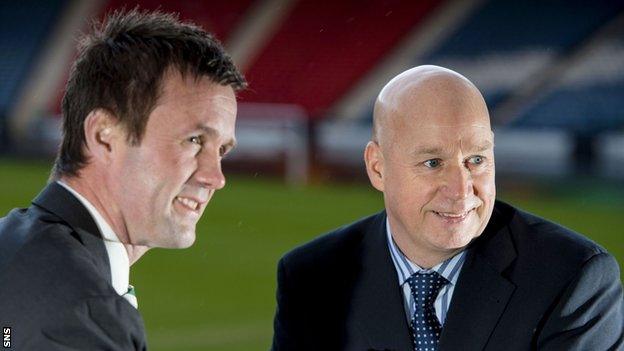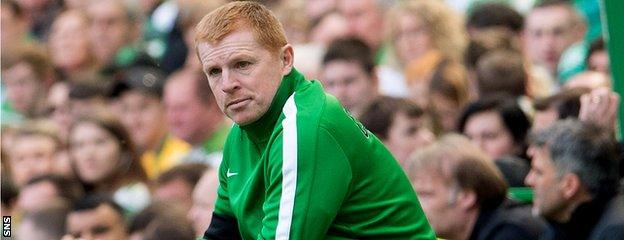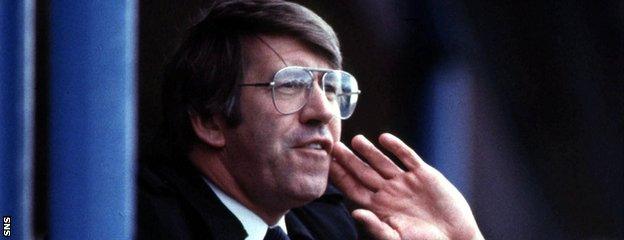Managing the Old Firm: Past bosses re-live the thrills and spills
- Published

Ronny Deila and Kenny McDowall will manage in the first Old Firm match since 2012
League Cup semi-final: Celtic v Rangers |
|---|
Venue: Hampden Park Date: Sunday, 1 February Kick-off: 13:30 |
Coverage: Live on BBC One Scotland, BBC Radio Scotland and BBC Sport website |
The Scottish League Cup semi-final will be an initiation ceremony for Ronny Deila and Kenny McDowall.
Celtic manager Deila has no experience of an Old Firm fixture, and while his Rangers counterpart has worked as coach and assistant in several meetings between the sides, he will not be fully prepared for the emotion and pressure that the occasion wreaks on managers.
"It's a different world, no-one can come from Holland or Sweden and get thrust into an Old Firm game and realise what's going to come, or what it's like," said Tony Mowbray, who managed Celtic for an eight-month period between 2009 and 2010.
The Englishman first experienced the fixture as a player, when he was a tall, imposing, commanding centre-back. It is a different occasion as a manager, though, when only two individuals on the day really understand, or feel the full extent of, the suffocating pressure of the obligation of being in charge of the Old Firm.
Eighteen men have managed Celtic, while 13 have held the same position at Rangers. Between them, only these individuals truly know how the game can crowd in on their working lives, and the need to cope with that intrusion and stress if they are to achieve success.
"I didn't really know what I was going into," said Graeme Souness, who managed Rangers from April 1986 to April 1991. "Managing Rangers, and Celtic must be the same, is the hardest job in British football.

Ex-Rangers boss Graeme Souness reckons managing an Old Firm side is the hardest job in football
"If you're top of the league and not playing very good football, the pressure's off. You can be second, and have had a couple of bad refereeing decisions but you're playing the better football, and the pressure all goes on [you].
"That can bring you down. I hadn't experienced that before. I was coming into this job believing that I could handle everything in my stride. I came up here [feeling] invincible. What a fool."
Mowbray had been a confident, assured and idealistic manager at Hibernian. The challenge of taking Celtic on from the Gordon Strachan era seemed to impose itself on him. He talked of the "small margins" of games that his Celtic side dominated yet didn't win, but the culture in Scotland was "look at the scoreboard".
He was followed by an iconic figure in Neil Lennon, who had been central to the success of Martin O'Neill's teams as a combative midfielder. He was a rookie in managerial terms, but the demands of the job - even when vindictiveness and threatening behaviour invaded his private life - only revealed the extent of his capability to succeed.
"It was a real challenge and one that I look back on with relish," said Lennon, who left the club last summer and now manages Bolton. "I miss it sometimes, I miss that intensity in my life.

Neil Lennon admits to sometimes missing the intensity of being Celtic manager
"As a player, [Old Firm games were enjoyable]; as a manager, no, because they're very fraught. It means everything to win the game for so many people.
"I remember being 3-0 up one day at Celtic Park, with 15 minutes to go, and thinking, 'if they get one they could get back into this'. That's the way your mind works. You only really feel relief when the final whistle goes.
"What you want to do is go and lie down. [But] they're great fixtures, and they always will be."
To John Greig, managing Rangers from May 1978 to October 1983 was "a lonely life, you don't see a lot of your family". For Davie Hay, who managed Celtic from August 1983 to May 1987, the pressures of one Old Firm game, when the referee David Syme mistakenly showed Tony Sheppard a red card before correcting his error, prompted a moment of fury.
"I wouldn't like to tell you what I said [to Syme]," Hay recalled. "After the game, I proposed that Celtic should leave Scotland and play in England. I [ended] up at the SFA for three offences on the one day."
As McDowall spoke about preparing for Sunday's Old Firm game, the first time the sides have met since April 2012, he talked about consulting Walter Smith, "the master" of these occasions. Smith's Rangers sides, over two periods at Ibrox, seldom lost to Celtic.

John Greig lamented that being Rangers manager was a lonely existence
Smith led Rangers to six of their nine league titles in a row during his first spell in charge, between April 1991 and May 1998, but he found a different environment on his return to the club in January 2007.
There was greater media coverage of the Old Firm, and with that scrutiny comes more pressure and a greater sense of being in the middle of a constant storm.
"There are five million people in Scotland and football is the biggest thing newspaper-wise," Smith said. "Although you look at the Premiership and say it's a bigger environment, media-wise it's nothing in comparison to Rangers and Celtic.
"In Scotland, we print every national newspaper, plus we have our own, then we have the broadcast aspect. It's quite a claustrophobic environment to work in.
"The bottom line is that if you win, everybody likes you; if you lose then they don't. A manager is there a lot of the time to protect his players and try to make sure they don't get badly affected by the levels of criticism.
"A lot of the boys who come in are really surprised at being put under the microscope. They can play in Scotland for a number of years and then they join the Old Firm and their performances are dissected and analysed and criticised. You have got to be prepared to take a fair amount of criticism."
.jpg)
Scotland and Aberdeen team-mates Alex McLeish and Gordon Strachan ended up Old Firm adversaries
For a time, the respective managers of Rangers and Celtic were Alex McLeish and Strachan, two old friends stretching back to their days as team-mates at Aberdeen. McLeish approached the Rangers job "in short stages. Can I win anything with Rangers? Can I beat Celtic with Rangers?"
He at least had the benefit of growing up a Rangers fan and fully understanding the environment he was working in. Strachan comes from Edinburgh, and had to adjust to the surroundings.
"The whole West of Scotland thing, if you're not brought up in it, is mind-blowing," he said. "You're either one or the other [Rangers or Celtic], and that goes through all walks of life."
McLeish and Strachan managed one meal together, with their wives, before effectively shelving their friendship until they left the positions. There is always room, though, for gallows humour between those who understand what it is to manage the Old Firm.
"[Rangers] beat us to go one point clear, and suddenly all these folk turned up [in the manager's room at Ibrox afterwards], Richard Gough, Graeme Souness, Mark Hateley," Strachan said.
"I [said], 'just a second, you'll be digging up old managers and bringing them in here just because [you] beat us', and Ally McCoist is rolling about laughing. 'Where we you lot when you got beat?'"
- Published29 January 2015

- Published29 January 2015

- Published29 January 2015

- Published7 June 2019

- Published20 June 2016
